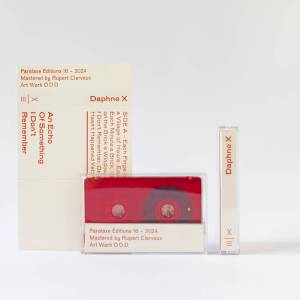 One of the greatest appeals of Daphne X is that one is never sure what she will try next. Will she shake the rafters with dark, industrial beats, or stretch her notes to filigree form? Will she decorate her tracks with field recordings, or imitate their use through creative instrumentation? The artist is in love with sound and all of its possibilities. In An Echo Of Something I Don’t Remember, every left turn has its own left turn, and yet the set as a whole is remarkably coherent.
One of the greatest appeals of Daphne X is that one is never sure what she will try next. Will she shake the rafters with dark, industrial beats, or stretch her notes to filigree form? Will she decorate her tracks with field recordings, or imitate their use through creative instrumentation? The artist is in love with sound and all of its possibilities. In An Echo Of Something I Don’t Remember, every left turn has its own left turn, and yet the set as a whole is remarkably coherent.
The first seven titles form an allusive poem: Each finger a pedal, each pedal a village of hours, each hour a house, each minute a brick, each hole on the brick a window to something I don’t remember or something that hasn’t happened yet. The words tinker with size and scale, alluding to the macro and micro details in Daphne X’s music, the expansive and the intimate. They imply that everything is part of a larger framework, but that frameworks can be broken down into components, each valuable on its own. With great care, the artist places disparate sound sources, Zen-like, in her sonic garden.
The tape begins with a whoosh of drone, an encroaching cloud, through which the artist’s voice wafts, impervious to shadow or mist. The voice seems to evaporate upon contact with the static, like dissipating manna. One struggles to hear the words, like important directions spoken once before the plunge, stolen by the wind. But then there is respite, a peace cast by the playing of an electric organ rescued from a flea market. In “Each Hour a House,” the skies open and the rain falls like notes, or the other way around: a deluge of sound set against a consistency of tone. If each hour is a house, and each minute a brick, is each collection of minutes a room? And if so, would we choose to live in the organic or the inorganic, the rain or the electronic echo? “Each Minute a Brick” offers dust-like suspension, backed by the sea: the slowly-falling melded to the ever-cycling. The tape may loop, but time edges imperceptibly forward.
In the title track and its companion, the artist uses every tool at her disposal: consonance and dissonance, voice and note, percussion and repetition, seeking to understand her relationship to time. In “Hands Are Flowers,” its title just beyond the door, she moves closer to the microphone, direct and declarative. What was ephemeral has become spiritual: not a mastery over time, but transcendence over time, as the artist becomes the hole, the brick, the window, the house, the village. (Richard Allen)
